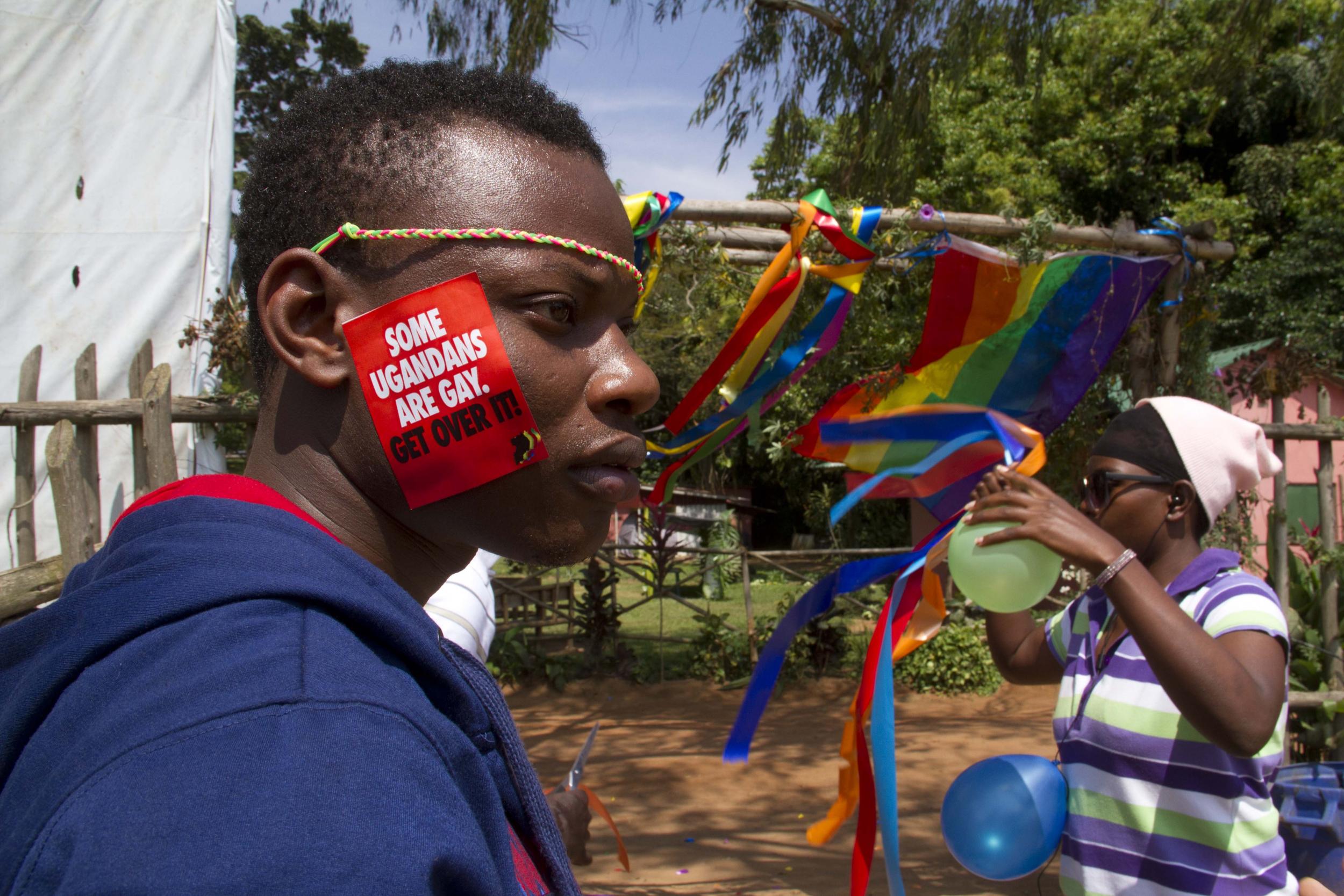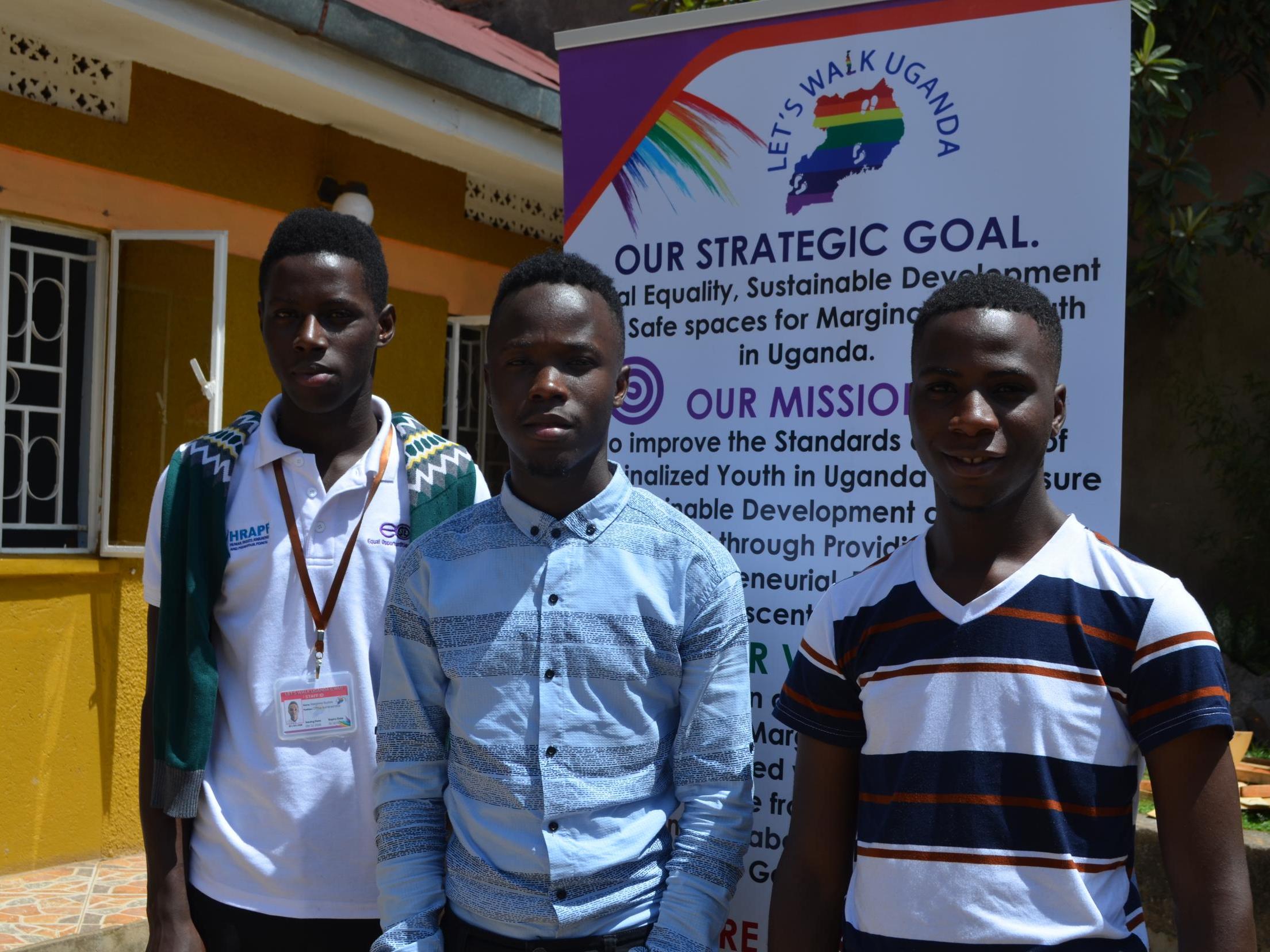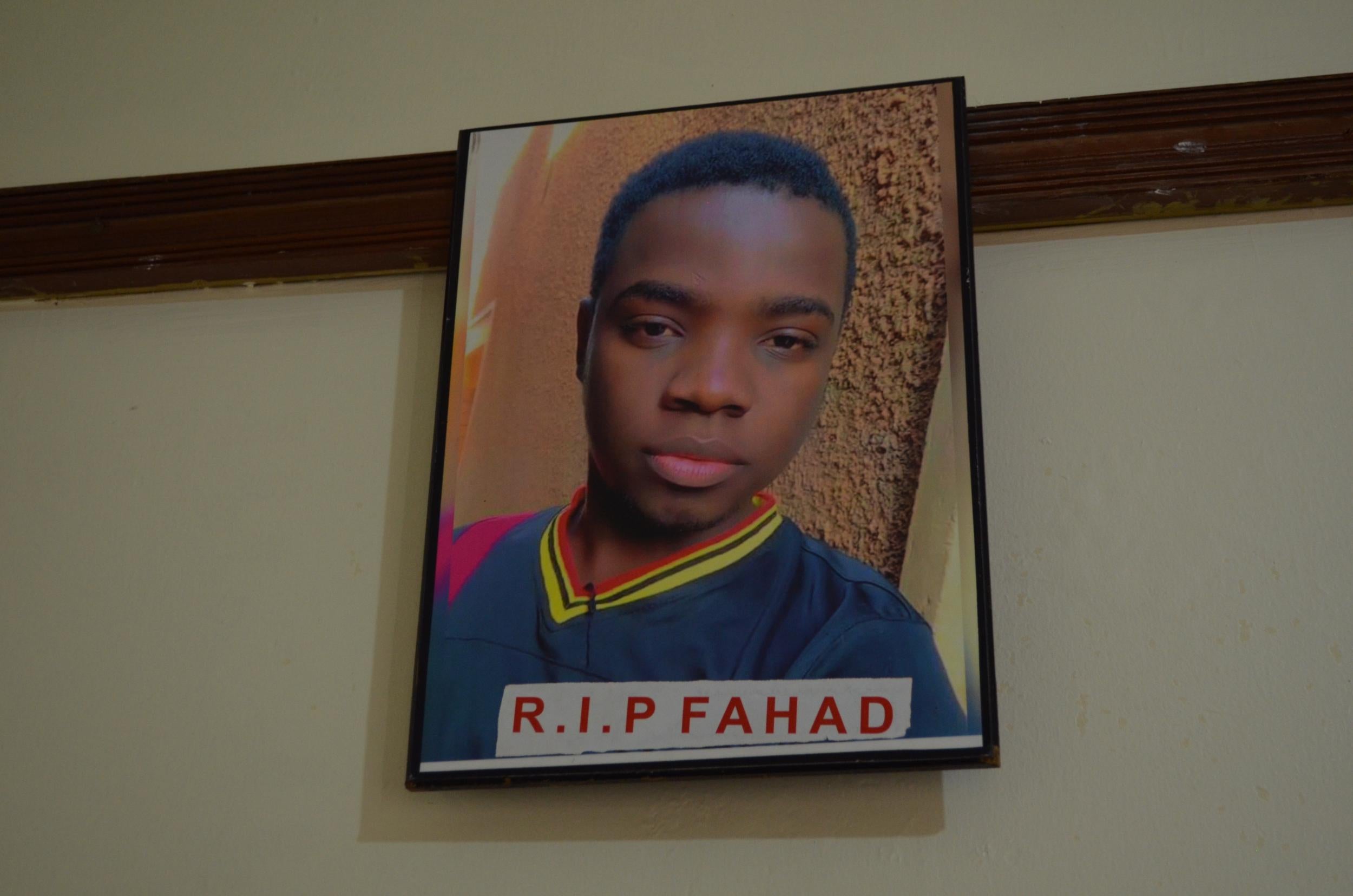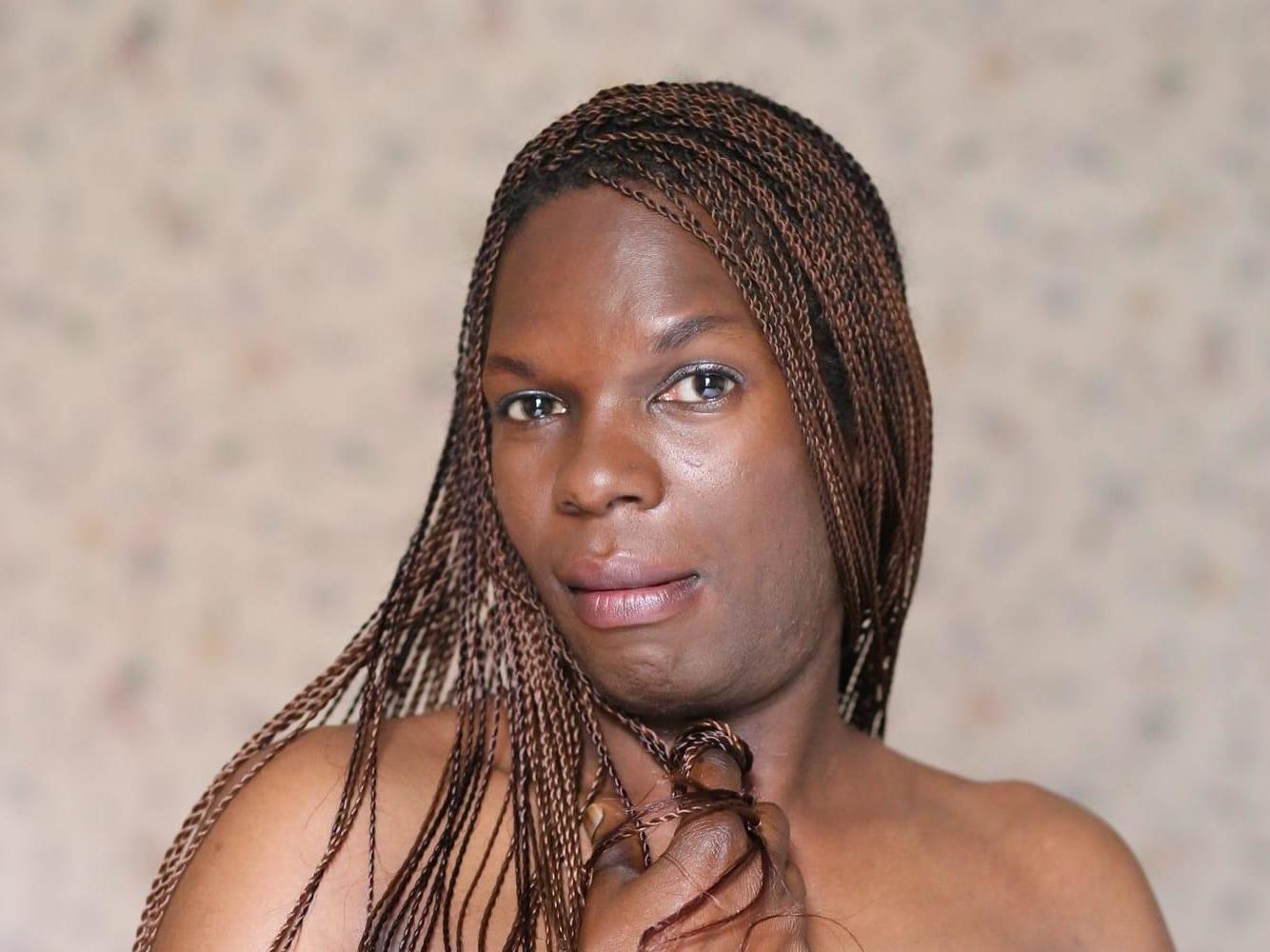Arrested, harassed and excluded from society: What it’s like to be LGBT+ in Uganda
Portia Crowe speaks to members of the LGBT+ community in Kampala about the daily persecution they face


When angry neighbours started to surround the shelter, Eric Ndawula tried to remain calm.
The 23-year-old volunteer at Let’s Walk Uganda – a charity and shelter for LGBT+ youth – messaged his supervisor, checked the emergency exit and, finding it was blocked, gathered the other young men inside.
As the crowd outside swelled into a mob, and people shouting homophobic slurs tried to scale the compound’s walls, Ndawula dialled a lawyer for advice.
“She told me, ‘Be strong,’” he tells The Independent.
“[That’s when] I couldn’t hold my tears – I just cried.”
Ndawula says he thought he might die that night. He called the police, but instead of dispersing the crowd, they arrested him and the 15 other gay men trapped inside. They charged them under a colonial-era anti-gay sex law, detained them for four days (twice the legal limit in Uganda), and subjected them to forced anal examinations, they say.
Some men were outed to their families, and at least one, who did not live at the shelter but had been visiting at the time of the incident, was made homeless after his parents learned of his sexuality.

A decade after Uganda grabbed international headlines for introducing a bill to make gay sex punishable by death – and half a decade after the resulting law was annulled – activists believe the LGBT+ community is under renewed threat. The ethics and integrity minister in October called for the Anti-Homosexuality Act to be reintroduced and although his appeal was quickly stifled, authorities are finding other ways to ostracise and intimidate the community.
“[2018] was one of the friendliest periods. No one was talking about homosexuality, we were fine,” Ndawula says, adding that the situation gravely deteriorated the following year.
“Grindr is no longer safe. Facebook is not safe.”
Sending a message
During the shelter residents’ detention, police singled Ndawula out as a leader, according to the people arrested. They said police tried to break his morale and turn them against him. While he was undergoing an hour-long anal examination, police told them to say he had “recruited” them to homosexuality.
Ndawula, who was the charity’s programmes officer at the time but has since been made executive director, said he was forced to ride alone, in broad daylight, in an open-air police lorry, and walk about 1.5km – handcuffed and in bare feet – through the shelter’s neighbourhood.
“I don’t know if I can ever step in that place again, because there were a lot of people watching me,” he says.
Kampala Metropolitan Police spokesman Patrick Onyango said: “The community complained to police that there are strangers around their area and that they go out late at night and the whole day they stay indoors. We took them under safe custody to verify the information.”
The men were later charged with having “carnal knowledge against the order of nature,” meaning gay sex, which is punishable by life in prison but difficult to prove. On 20 December, the case was closed on the advice of the state attorney, who found no evidence of the crime.
But Let’s Walk Uganda got the message. It quickly moved locations, and separated the shelter from its office.
On the wall hangs a framed photograph of 21-year-old Fahad Ssemugooma Kawere, a former resident and one of at least two queer people killed by citizen mobs last year. No one has been arrested or charged for their murders.

The charity has had to tighten security and enforce new rules for shelter residents. Visitors are strictly vetted before receiving the location, and residents are no longer allowed to come and go after 10pm.
“The last thing we want is the police lurking here,” says Ndawula.
‘This is not the end’
Police also raided Ram Bar, Kampala’s only gay club, on 10 November, arresting 127 people and parading them in front of local media. Instead of gay sex, they laid charges of drug use, which were later amended to being a public nuisance. It nevertheless took a toll on the community.
“People lost jobs,” says Diana Karungi, a lesbian activist who was arrested that night. Prolonged detentions for some meant they missed work without explanation. Two were held behind bars for more than four months.
Others were made homeless by families and landlords. At least one woman was disowned after appearing in court, according to Joan Amek, co-founder of the Rella Women’s Foundation, which housed some of the women.
Muwonge Gerald, Ram’s owner, is now housing a handful of men who were outed in the raid.
Gerald, who was also arrested, said he was tailed by police for months after being released on bail. He is now looking for a way to leave Uganda.
“I think more is going to happen,” he says in a hushed voice from the corner seat of a Kampala restaurant patio that afforded him a good view of the street.
“This police officer told us that this is not the end.”
Forty-two people are still awaiting trial. Twenty-five have had their cases dismissed for want of prosecution.
More recently, on 29 March, another LGBT+ shelter was raided by police and 19 people charged – this time with disobeying Covid-19 lockdown rules. They have been held for over a month without a bail hearing and face up to seven years in prison.
“The videos of the arrest indicate that it was because of suspicions that they are gay,” says their lawyer, Justine Balya. She says the mass arrest “was just a homophobic attack disguised as Covid regulation”.
‘We have to be in these spaces’
A more subtle tactic is the sudden closure of LGBT+ events. Last May, police shut down an International Day Against Homophobia, Transphobia and Biphobia celebration hosted by a law firm. In August, a group of 35 trans women were arrested in eastern Uganda at an educational workshop. Being transgender is not illegal, but trans people are often arrested on vagabond or impersonation charges.
Trans activist Beyonce Karungi was among those present.
“They said we were promoting homosexuality,” she says. “The advocacy that I do... that’s why we’re here today.”

Diana Karungi, the lesbian activist, said campaigners are “a lot more vulnerable, because we have our faces out there, we have our voices out there, and we have to be in these spaces”.
As a security precaution, she only uses trusted Uber drivers when working, or one-off motorcycle taxis that do not wait around. She also avoids socialising in large gatherings of LGBT+ people, instead spending her time in smaller groups in straight spaces. The night of the raid was the first time she had been to Ram in two or three years, she says.
With the nightclub closed, there are no longer any formal gathering places for the community. And with the resurgence of anti-LGBT+ sentiment, Karungi believes some may even go back in the closet.
But that would be a step too far for her.
“I’d rather enjoy the minimal freedom I have, as who I am, than that ‘freedom’ when you’re tucked away somewhere,” she says. “I can’t go back.”
Join our commenting forum
Join thought-provoking conversations, follow other Independent readers and see their replies
Comments